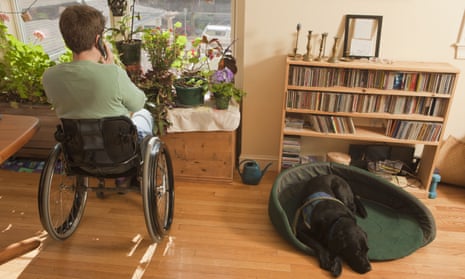Your article (Stress, anxiety and depression levels soar under UK Covid-19 restrictions, 16 September) is right to highlight the impact of lockdown measures on people’s mental health. The effect on disabled people’s wellbeing must also be recognised.
A YouGov poll commissioned last week by the housing association Habinteg revealed that, of those disabled people surveyed, their wellbeing during lockdown was three times more likely to have been damaged by living in unsuitable homes. Also, disabled people were 17 times more likely than non-disabled people to be unable to carry out all daily tasks, such as using the kitchen and bathroom, without assistance.
The government has announced a consultation on raising accessibility standards for new homes. With many disabled people continuing to spend more time indoors it is essential that these standards are improved so that all new homes are accessible (for example, with wider doorways and waist-high power points) and adaptable.
Celia Thomas
London
